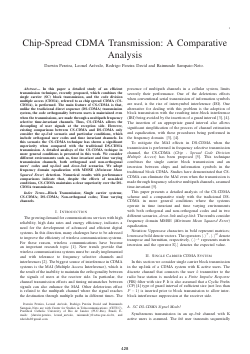
Chip-Spread CDMA Transmission: A Comparative Analysis
Darwin Pereira, Leonel Arévalo, Rodrigo Pereira David, Raimundo Sampaio-Neto
DOI: 10.14209/sbrt.2016.32
Evento: XXXIV Simpósio Brasileiro de Telecomunicações (SBrT2016)
Keywords: Transmission Single carrier systems CS-CDMA DS-CDMA Non-orthogonal codes Time varying channels
Abstract
In this paper a detailed study of an efficient transmission technique, recently proposed, which combines the single carrier (SC) block transmission, and the code division multiple access (CDMA), referred to as chip spread CDMA (CSCDMA), is performed. The main feature of CS-CDMA is that, unlike the tradicional direct sequence (DS-CDMA) transmission system, the code orthogonality between users is maintained even when the transmissions, are made through a multipath frequency selective time-invariant channels. Thus, CS-CDMA allows the decoupling of user signals at the reception side. However, existing comparisons between CS-CDMA and DS-CDMA only consider the up-link scenario and particular conditions, which include orthogonal user codes and time invariant channels. In this scenario the CS-CDMA technique has shown a significant superiority when compared with the traditional DS-CDMA transmission. A detailed analisys of the CS-CDMA techique in more general conditions is presented in this work. We consider different environments such as, time invariant and time varying transmission channels, both orthogonal and non-orthogonal users’ codes and up-link and down-link scenarios. We adopt frequency domain equalization with MMSE (Minimum Mean Squared Error) detection. Numerical results with performance comparisons indicate that, despite the effects of non-ideal conditions, CS-CDMA maintains a clear superiority over the DSCDMA transmission.Download